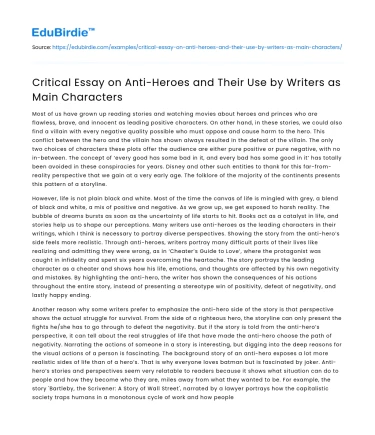Most of us have grown up reading stories and watching movies about heroes and princes who are flawless, brave, and innocent as leading positive characters. On other hand, in these stories, we could also find a villain with every negative quality possible who must oppose and cause harm to the hero. This conflict between the hero and the villain has shown always resulted in the defeat of the villain. The only two choices of characters these plots offer the audience are either pure positive or pure negative, with no in-between. The concept of ‘every good has some bad in it, and every bad has some good in it’ has totally been avoided in these conspiracies for years. Disney and other such entities to thank for this far-from-reality perspective that we gain at a very early age. The folklore of the majority of the continents presents this pattern of a storyline.
However, life is not plain black and white. Most of the time the canvas of life is mingled with grey, a blend of black and white, a mix of positive and negative. As we grow up, we get exposed to harsh reality. The bubble of dreams bursts as soon as the uncertainty of life starts to hit. Books act as a catalyst in life, and stories help us to shape our perceptions. Many writers use anti-heroes as the leading characters in their writings, which I think is necessary to portray diverse perspectives. Showing the story from the anti-hero’s side feels more realistic. Through anti-heroes, writers portray many difficult parts of their lives like realizing and admitting they were wrong, as in ‘Cheater’s Guide to Love’, where the protagonist was caught in infidelity and spent six years overcoming the heartache. The story portrays the leading character as a cheater and shows how his life, emotions, and thoughts are affected by his own negativity and mistakes. By highlighting the anti-hero, the writer has shown the consequences of his actions throughout the entire story, instead of presenting a stereotype win of positivity, defeat of negativity, and lastly happy ending.
Another reason why some writers prefer to emphasize the anti-hero side of the story is that perspective shows the actual struggle for survival. From the side of a righteous hero, the storyline can only present the fights he/she has to go through to defeat the negativity. But if the story is told from the anti-hero’s perspective, it can tell about the real struggles of life that have made the anti-hero choose the path of negativity. Narrating the actions of someone in a story is interesting, but digging into the deep reasons for the visual actions of a person is fascinating. The background story of an anti-hero exposes a lot more realistic sides of life than of a hero’s. That is why everyone loves batman but is fascinated by joker. Anti-hero’s stories and perspectives seem very relatable to readers because it shows what situation can do to people and how they become who they are, miles away from what they wanted to be. For example, the story 'Bartleby, the Scrivener: A Story of Wall Street', narrated by a lawyer portrays how the capitalistic society traps humans in a monotonous cycle of work and how people become bleak, materialistic, and greedy day by day. The author showed readers that it is important to realize and analyze the situation of others before judging their actions. Portraying anti-heroes as protagonists teaches us to widen our views and grow curiosity in us to discover the reasons for someone’s actions.
Sometimes, anti-heroes are presented as protagonists to break the monotony in literature. Many stories have been told and written about the heroic deed and lives of heroes. But the anti-heroes have not been highlighted much in comparison to the heroes. To satisfy the curiosity of readers about the perspective of anti-heroes, some writers initiated to present the villain’s side of the story. For example, we may count Hitler and his vision of life. He is considered an example of evilness around the whole world, but he too had reasons, thoughts, and logic behind his actions. Making an anti-hero the protagonist aims to bring up these kinds of views and judgments in front of the readers. I believe, every action of every individual, regardless of whether good or bad, has a reason. Just like Mark Twain has mentioned in ‘What Is Man?’, there is no such thing as a selfless act. Pulling out the thoughts and points of view of anti-heroes, in cases of justifying their actions, is one of the objectives of placing them as leads by writers.
In conclusion, some writers choose to present the negative characters as leads and highlight them in their writings to bring a change in the world of literature. There is no harm to present things from an unusual perspective. Moreover, this technique offers the advantage of engaging the readers more with writing because the writing written from an anti-hero’s perspective is more realistic, relatable, and interesting to the readers.






 Stuck on your essay?
Stuck on your essay?

